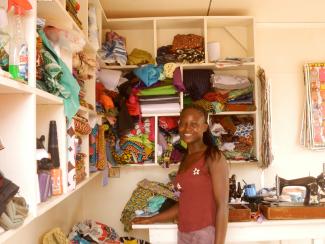Post-2015 agenda
“New spirit”

Markola is the central market district in Accra, the Ghanaian capital. Commercial stalls, fast-food restaurants and small shops mark the entire neighbourhood. This is where Baah Kwabena runs his business. “The location is very good; lots of people come here,” he says.
He opens his store at six in the morning and sells food tins, chewing gum, toilette paper and many other consumer items. He mostly sources the goods from Ghanaian producers and sells them on to retail vendors. His clients purchase their goods early in the day in order to be able to supply their own customers in their own shops or as street hawkers. With a staff of six employees, Kwabena handles everything from procurement to logistics and sales.
Markola is dominated by small and mid-sized enterprises (SMEs) of this kind. Kwabena is doing well. He can afford a small house and is raising three children.
Obviously, not all Ghanaians manage to thrive on self-employment like Kwabena does. Jobs are hard to find in many African countries. Birth rates are high, and the number of jobs is not keeping up with growing populations. In Uganda, for instance, where half of the population is age 15 or younger, masses of youngsters will be looking for work in the next couple of years. Countries like Uganda need successful entrepreneurs to make the difference.
Assuming responsibility
Generating more employment is likely to be on the new list of universal goals that the UN is set to define for the years beyond 2015. In 2000, world leaders first agreed on a set of global goals in the UN context. These Millennium Development Goals (MDGs) were supposed to be met by 2015. Since then a lot – though not everything – has indeed been achieved, and UN Secretary-General Ban Ki-moon appointed a High-Level Panel of eminent persons to propose new goals for the years after 2015. The Panel published its report in late May, and improving the jobs situation was one of the 12 new goals it came up with (see essay by Sabine Balk in D+C/E+Z/7-8, p. 278).
The MDGs basically addressed governments. On their own or in cooperation, they were supposed to reduce poverty by one half, stem maternal and child mortality and achieve the other MDGs. For the purpose of generating jobs, however, the private sector matters most. Accordingly, it makes sense to involve business leaders in setting the UN’s post-2015 agenda. Unlike the MDGs, moreover, the post-2015 agenda is not supposed to focus primarily on developing countries. Ban’s High-Level Panel has spoken out in favour of a “global partnership” with universal goals that apply to all nations.
Three members of the High-Level Panel – Horst Köhler (Germany’s former president), Betty Maina (the chief executive of Kenya’s Association of Manufacturers) and Fulbert Gero Amoussouga (the head of the Economic Analysis Unit of Benin’s president) – turned to DEG (Deutsche Investitions- und Entwicklungsgesellschaft), asking this branch of KfW to organise a meeting of African and European entrepreneurs. “Political leaders often have good ideas,” says Amoussouga, “but they tend to lack partners for implementation.”
In late June, the DEG hosted the “Chance Entrepreneurs’ Dialogue” in Accra. Business leaders from various countries and industries shared insights and assessed challenges. The question what conditions companies from the continent and other world regions need to do good business in Africa got a lot of attention. Paricipants also discussed corporate responsibilities.
Supporting entrepreneurs
Private sector companies need the right kind of environment to thrive and allow their countries to flourish. Governments must contribute to creating the appropriate business climate. The outcome document of the conference in Ghana sums up the core elements of an “enabling environment”:
- Financial services must be reliable and readily available throughout a country.
- Governments must ensure good infrastructure, for instance in terms of energy supply or transport facilities. Public-private partnerships can prove useful in this context.
- Governments must draft and implement industrial policies, so Africa will not only export commodities but also process them in the future. In any case, Africa must create more value.
- Education and vocational training are crucially relevant since more people – women and young people in particular – must acquire knowledge and skills in order to become productive empoyees.
- Integration in regional economic communities must advance, boosting competitiveness and reducing obstacles such as customs and taxes.
- National governments must enforce laws reliably, including coherent and sensible tax legislation.
- The international community must organise an open and fair regime for world trade as well as a solid financial architecture. “This is an appeal to all governments in the world,” Köhler said in Accra. “The trade system is not fair enough.” African companies certainly deserve access to rich nations’ markets.
Baah Kwabena in Makrola market understands the relevance of all these issues. Financial services are an example. Entrepreneurs depend on access to credit. Kwabena often requires loans to procure the supplies he needs in his shop – but not every bank will grant such loans. And those who do tend to charge high interest rates and spend a long time with paper work.
Hubertus Graf von Plettenberg works for the DEG and says that, in most African countries, both micro credit and large-scale credit is readily available. In between, however, he sees a huge gap. SMEs struggle to get financing worth several thousand rather than millions of dollars. The success of SMEs and start-ups, however, especially depends on credit. And these are the companies that create the most jobs. “Germany has faired will with its dispersed and diversified banking industry,” Plettenberg says. He explains that commercial banks, cooperatives and municipal savings and loans coexist in Germany, with each category serving its specific market segment.
Kwabena knows one Ghanaian bank that suits his most important need. The UT bank has promised to disburse loans in 48 hours. Sometimes he even gets the money within 14 minutes, Kwabena reports. The management of UT Bank considers business with SMEs to be very promising. So far, however, other banks have not taken this approach in Ghana.
A new global partnership
“Discussions with entrepreneurs have made it clear that they share our goals,” Maina said after the event in Accra. Köhler agreed: “We need to move forward together. We need a new global partnership, a new spirit of cooperation.”
Richard Kimani Rugendo is the founder of Kevian Kenya, a company that produces fruit juices. In his eyes, the global north and global south face the same challenge. “We must leave the world in a better and more sustainable condition to the next generation.” Cooperation of north and south can be fruitful, as Hartmut Sieper, the founder of the German company Trans Africa Invest, points out. He says that 60 % of potential and so-far unused agricultural land is in Africa and foreign direct investments in this sector could generate millions of new jobs.
Private-sector businesses are not only about profit, as became evident in Accra. “Never before have I attended a meeting with entrepreneurs who showed such an interest in their environmental and social responsibility,” says DEG expert Plettenberg. Köhler’s assessment was: “The entrepreneurs are taking social and environmental responsibility into account, and they see ways for running profitable businesses on that basis.”
“We are quite satisfied with the results of our dialogue,” Köhler said in Accra. “We have established a network of people who are willing to listen to one another and want to cooperate in a constructive way.” Köhler promised to forward the outcome document to the other members of the High-Level Panel.
Eva-Maria Verfürth is a member of D+C/E+Z’s editorial team.
eva-maria.verfuerth@fs-medien.de














